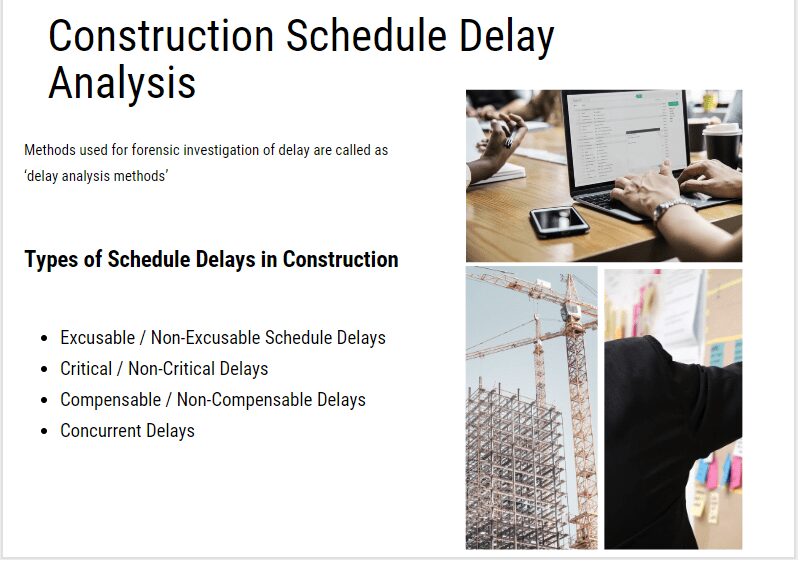Delay is quite common, especially in construction projects. A delay can be caused by the client, contractor, and the third party or force majeure that nobody can control. Delay in the completion date of a construction project could lead to significant losses on society as well as the project cost. The damage caused by a project delay is compensated by the contractor in principle in the form of ‘liquidated damage’. However, the Contractor shall claim the extension of time or the recovery of a financial burden if the employer is liable for the cause of delay. In fact, a variety of factors cause delays in project completion such as complex interdependencies of a number of tasks. Therefore, determining what causes the delay and who is responsible for that is the first step of the dispute resolution process in construction projects. Methods used for the forensic investigation of delay are called ‘forensic schedule delay analysis methods. In this article, we will talk about construction schedule delay analysis and types of schedule delays.
Table of Contents
Types of Schedule Delays in Construction
Change orders, financial burdens, weather conditions, poor design, and lack of experience are common causes of delays in construction projects at any scale. Each cause corresponds to a particular delay. In order to perform a construction schedule delay analysis, you need to understand the effects of that factors. Classification of delays helps you to decide what type of analysis to be performed for the circumstance.
Below are different types of schedule delays
Excusable / Non-Excusable Schedule Delays
Excusable delays are originated from conditions that are unexpected and not within the contractor’s or the client’s control. On the other hand, non-excusable delays are a result of a delay that was within the control of the contractor or the client.
Examples for Excusable Delays
- General labor strikes
- Natural disasters like floods, storms, and earthquakes.
- Errors and omissions in the designs
- Lack of action by governmental bodies
Examples for Non- Excusable Delays
- Delay in mobilization
- Delay in the submission of documents
- Late performance of subcontractors
- Faulty workmanship
Non-excusable delays can be either compensable or non-compensable. Understanding the difference between Excusable and Non- Excusable Delays key to perform an effective construction schedule delay analysis.
Critical / Non-Critical Delays
A Critical Schedule Delay is one that impacts the project’s completion date. If it does not affect the activities on the critical path, it is a non-critical delay.
Compensable / Non-Compensable Delays
Compensable delays are those where there’s going to be some compensation involved for the delay to the project. Non-compensable delays are caused by something beyond the control of both the client and the contractor.
Concurrent Delays
Concurrent Delays are reciprocal delays originated by the contractor and the client, that might affect the critical path of the project schedule and the completion date.
Basic Tools in Construction Schedule Delay Analysis
CPM Schedule
Critical inspections on a delayed project include the estimate of the necessary time for completing it and identification of the sequence of activities that triggers a shift in the overall project completion date. A sound estimate of project duration requires valid assumptions on how the project is carried out. CPM or Critical Path Method is one of the most common modeling techniques to determine a project’s completion date by calculating the critical path and total float.
In addition, it must prospectively forecast the likely effect of changed circumstances. CPM technique uses project network diagrams depending on primarily two variables which are activity durations and relationships. Given the set of activities involved in a construction project with those durations and activity relationships, the CPM uniquely derives the necessary time for completing the project. CPM provides a formal structure that systematically describes the project schedule in a way that can simulate the time impact of any change in construction project assumptions.
As-Planned Schedule
The as-planned time schedule is supposed to show the Contractor’s true intentions, what activities were planned to be performed, when, in which sequence, etc. as detailed as possible. It is often made by using a software tool. The date of project completion agreed on the contract is calculated based on the as-planned schedule. It is not rare that the analyst may need to correct the baseline schedule before relying on it in any substantive way due to inherent flaws or errors in a contractor’s assumption. If the completion date is determined based on the flawed as-planned program, the project time could be too short which results in a delay to completion. Delay originated from a poorly established as-planned schedule does not allow the Contractor to claim an extension of time. Thus the preparation of a reliable as-planned schedule is essential. The as-planned schedule is itself a theoretical model of how a particular contractor would like to build a project. To build a valid as-planned schedule, the contractor must identify all relevant information to define the CPM schedule. As a construction project usually involves a number of activities, the validation of an as-planned schedule requires a lot of effort. However, the availability of a reliable as-planned schedule is a prerequisite for the integrity of any conclusion.
As-Built Schedule
The as-built schedule should reflect how a contractor actually performed its work. Ideally, an as-built schedule should be prepared and maintained during the course of the work. Otherwise, it cannot be prepared retrospectively unless a reasonably detailed schedule is not available. Note that using construction scheduling software like Primavera P6 helps to make schedule delay analysis.
This blog post “Construction Schedule Delay Analysis” is written by our guest blogger “Ali Osama, Senior Planning Engineer”. We would like to express our thanks to him for his studies.
Read Also
Forensic Schedule Delay Analysis
External Reference
Senior Planning Engineer
















Great Article. But it is difficult to understand if the delay is attributable to the client and if it is a concurrent.
Thnk you
Sometimes delays may be great for making the project perfect, though.
Analysing the data is one of the most important thing in business life we have to do it carefully and logical